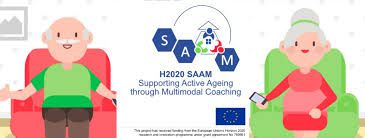 With a budget of nearly €4 Million, the EU-funded SAAM project will support the EU ageing population with innovative technology and coaching.
With a budget of nearly €4 Million, the EU-funded SAAM project will support the EU ageing population with innovative technology and coaching.
The SAAM (Supporting Active Ageing through Multimodal coaching) project aims to develop and validate a Virtual Assistant-Coach in a controlled environment. The Assistant-Coach will support the process of healthy ageing, preserving physical, cognitive, mental, and social well-being of older citizens for as long as possible.

Innovative support for the ageing population
A novel and practical emphasis will be put on ambient sensing and learning of user needs and preferences, and effective coaching by leveraging the user’s social support networks: The future autonomous modular system will offer an integrated approach for influencing and encouraging social contacts.
An international cooperation
Over three years, the SAAM’s partners will develop and test new methods allowing Europe’s ageing population to remain active, independent and longer in their homes. This project was awarded a maximum budget of € 3,996,400 under the framework program for research and innovation Horizon 2020, and integrates the following research groups, universities and companies:
• Balkan Institute for Labour and Social Policy (BG)
• Institute Josef Stefan (SI)
• University of Edinburgh (UK)
• Paris-Lodron University of Salzburg (AT)
• Scale Focus AD (BG)
• Interactive Wear AG (DE)
• University Rehabilitation Institute (SI)
• Bulgarian Red Cross (BG)
• National Catholic Federation Caritas (BG)
• Austrian Platform of the European Federation of Older People EURAG (AT)
• According to the project experts, Europe faces an on-going crisis in caring for its ageing population. Citizens are living much longer than ever before, with increasingly complex medical, social, and infrastructural needs, but most EU social support services and structures are lagging very much behind the growing need.
While many efforts have focused on better access to healthcare and the expansion of assisted and social care housing, one of the main intervention points, enabling the ageing population to remain in their homes longer, is just now becoming a primary developmental priority. Caring for the ageing population as they transition from active and independent lifestyles to those requiring significant external support is a large and complex field, with many approaches to the great diversity of citizen need profiles.
Source: European Commission